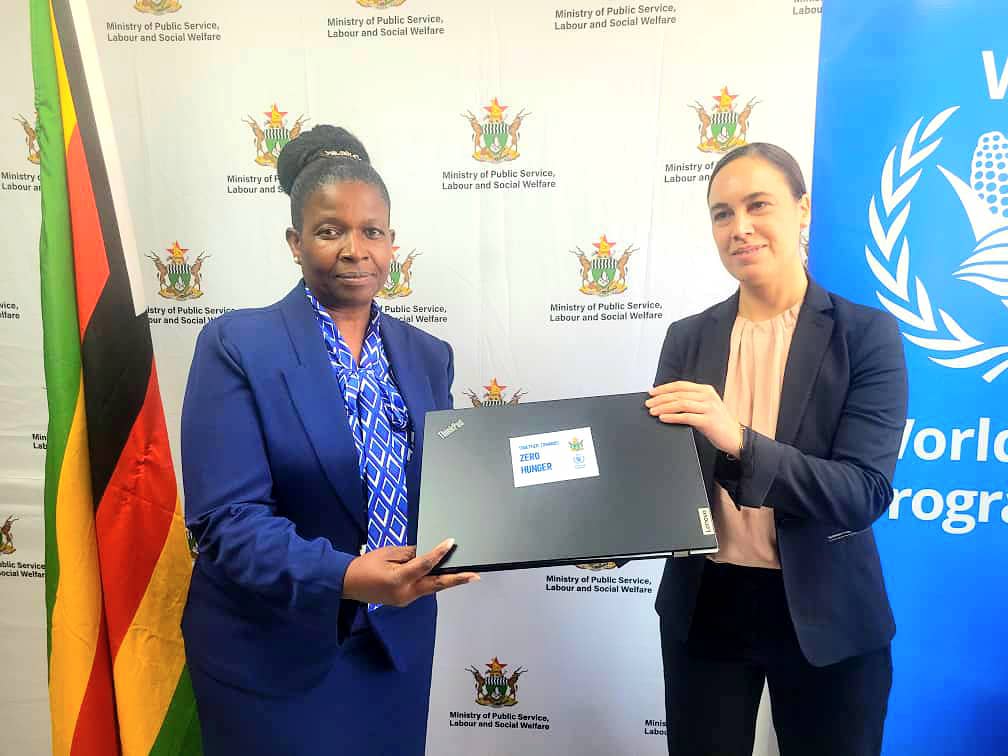|
Getting your Trinity Audio player ready…
|
The United Nations World Food Programme (WFP) has partnered with the Government of Zimbabwe by providing information communication technology (ICT) equipment to alleviate hunger in the country.
The WFP today handed over ICT equipment to the Ministry of Public Service, Labour, and Social Welfare. The donation comprised 75 tablets, 5 laptops, 2 desktops, and 3 printers.
In her acceptance speech, Hon Mercy Dinha, the Deputy Minister of Public Service, Labour, and Social Welfare said the handover of the gadgets could not have come at a better time as the Ministry has now embraced e-governance as per the provisions of the NDS 1 where it launched the Integrated Social Protection Management of Information System (ISPMIS).
“Indeed, the gadgets played a pivotal role as we piloted our ISPMIS in the 9 Cyclone Idai districts. This donation today will continue to strengthen the capacity of the Ministry as we are aiming at rolling out the ISPMIS in all 65 districts Let me acknowledge the continued support that the WFP extends to Zimbabwe to ensure vulnerable people are reached with food. This is in line with provisions of the NDS1 which stresses the need for provision of social protection services, such as food, to food insecure populace.
“Special mention goes to the complementary role that WFP played during the just-ended FDMS/LSA cycle where you were reaching out to 264,080 beneficiaries in Buhera, Chivi, Mangwe and Mwenezi districts I would also like to appreciate the Technical Support that you rendered in Kariba, Mt Darwin, Bikita, Masvingo and Umguza districts,” Hon Dinha said.
The Government of Zimbabwe remains committed to providing Social Protection to its vulnerable citizens as espoused in the Constitution and various pieces of legislation. The WFP donation will go a long way in enhancing social protection, which includes the Harmonised Social Cash Transfers, the Basic Education Assistance Module, and the Food Deficit Mitigation Strategy, among others.
Recently, President Mnangagwa declared the 2023-2024 agricultural season as a national disaster, opening room for the participation of multiple stakeholders in ameliorating hunger.
The WFP Zimbabwe Head of Programme, Nina Beretta Piccoli, said in an age when digitalisation is becoming the norm, dependable ICT infrastructure is critical for increasing efficiency and ensuring inclusivity in social assistance programmes. She said the Integrated Social Protection Management Information System (ISP MIS), developed in collaboration with the government, exemplifies how technology can streamline processes and improve service delivery.
Through the donation, WFP aims to contribute to strengthening the capacity of the Ministry further to roll out and implement the ISP MIS at both national and sub-national levels.
The UN senior official said the tablets provided will facilitate the collection of crucial data on beneficiaries, ensuring that assistance reaches those who need it most promptly and efficiently. Additionally, the laptops, desktops, and printers will empower programme managers and field workers alike, enabling them to access and utilise important information to enhance the effectiveness of social protection programmes.
“Furthermore, this donation aligns closely with the priorities outlined in the National Development Strategy 1, particularly the objective of creating a digitalised economy by 2030. By investing in ICT infrastructure and capacity building, we are supporting the government’s vision for economic transformation and laying the groundwork for a more inclusive and resilient society.
“In light of the challenges posed by El Niño, which has exacerbated food insecurity and livelihood vulnerabilities across Zimbabwe, our commitment to supporting the country has taken on even greater significance. The recent declaration of a state of disaster underscores the urgent need for collective action to mitigate the impacts of climate change and ensure the resilience of communities.
“Through initiatives like the donation of ICT equipment, we are addressing immediate needs and investing in long-term solutions that will strengthen Zimbabwe’s capacity to withstand future shocks. As we navigate these uncertain times together, WFP reaffirms our solidarity and determination to build a more resilient and food-secure future for all Zimbabweans. Together, through continued collaboration and partnership, we can overcome the challenges that lie ahead and build a brighter future for generations to come,” Piccoli said.
